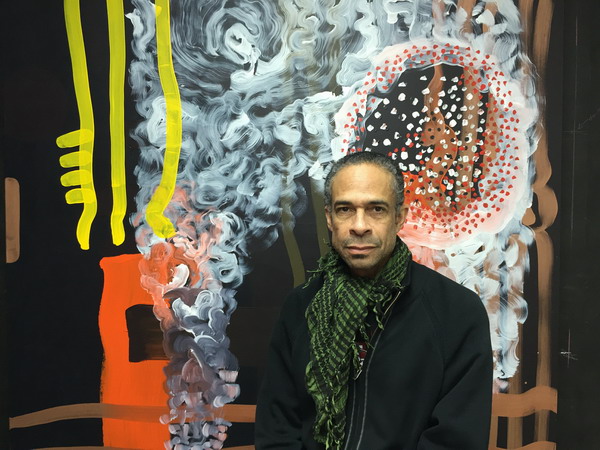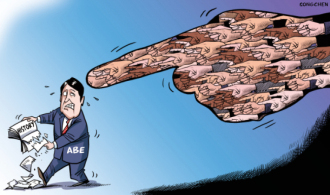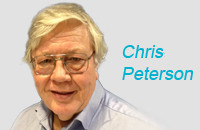One cool cat's exhibit now on at 798's UCCA
By Harvey Dzodin (chinadaily.com.cn) Updated: 2016-01-22 10:45
 |
|
Photo credit Peter Wayne Lewis at The Oasis, 2015, Courtesy of the artist. [Photo provided to China Daily] |
Jamaican-born artist Peter Wayne Lewis is one cool cat who you’ll really dig. Not the feline variety but, in the slang called "jive", associated with African-American jazz artists and which Lewis frequently uses, you just know that he is really hip. His uplifting artistry in vivid colors, using acrylic paint, reflecting his life-long association with jazz and jive, can be seen at 798’s Ullens Center for Contemporary Art until March 13.
Lewis’ exhibition, Booster, is twinned with a parallel exhibit of the works of the late American artist Frederick J. Brown. Both are truly soul brothers from the African diaspora whose expressive paintings draw inspiration from their respective cultural backgrounds and shared interest in jazz and spirituality. Exploring distinct modes of abstraction, the two groupings of works create a dialogue through vibrant collisions of brushwork and color, rhythm and melody.
Both artists have a strong bond with Beijing. For the past decade Lewis has created most of his work in his Beijing studio, called "Oasis". Brown' s connection, although more fleeting, was a ground-breaker: in 1988 he was the first American artist to show at what is now the National Museum of China on Tiananmen Square. As UCCA Director Philip Tinari said, "to make an exhibition with an American artist in China in 1988 was no small feat."
Lewis' exhibit centers on two major suites, Monk Time Suite, (2013) and Buddha Plays Monk, (2012-2015), each comprising 15 paintings, in which his particular language of abstraction takes new and unexpected turns, inspired by sources as varied as quantum physics and the music of jazz legend Thelonious Monk.“There is an idea in string theory that all matter exists as vibrating strings moving in multiple dimensions. This idea links physics to my great love, music. The vibration of the strings creates harmony the universe is a symphony of color and light and different time signatures,” Lewis has said.
They are complemented by further recent works, particularly a cycle of six paintings titled, False Vacuum, (2015) inspired by the ideas of MIT physicist Alan Guth. All that’s missing is a jazz saxophone to complement the paintings.
Brown worked in a loft in New York’s SoHo during the artistic renaissance of the 1970s and 1980s. He collaborated with jazz musicians like Ornette Coleman, Thelonious Monk and Anthony Braxton, as well as abstract expressionist painter Willem de Kooning. This grouping of works presents a range of painted investigations embodying religious themes with early childhood memories. When Brown exhibited in China in the spring of 1988, his works were eagerly received and debated by Chinese artists and students for their vivid expressionistic sensibility. Reviving these works in the same city nearly three decades later helps to shed light on a little-known moment of exchange during the artistic awakening of the Chinese in the 1980s.
My favorite work, both for the title' s sly play on words and its brilliant coloring and energetic strokes, is the 15 canvas suite, Buddha Plays Monk,. Lewis muses that if Buddha were alive today he’d dig both the paintings and Monk' s jazz. He says that like Beethoven' s Ninth Symphony, from which he also drew inspiration, the various components have their thematic content as well as ebbs and flows. And he added that he will have failed if the viewer, having moved through all 15 paintings, hasn' t been changed by the journey.
Take this journey yourself and see if you were changed by this lyrical riot of shapes and colors.
The author is a senior adviser to Tsinghua University and former director and vice-president of ABC Television in New York.
The opinions expressed here are those of the writer and don't represent views of China Daily website.











